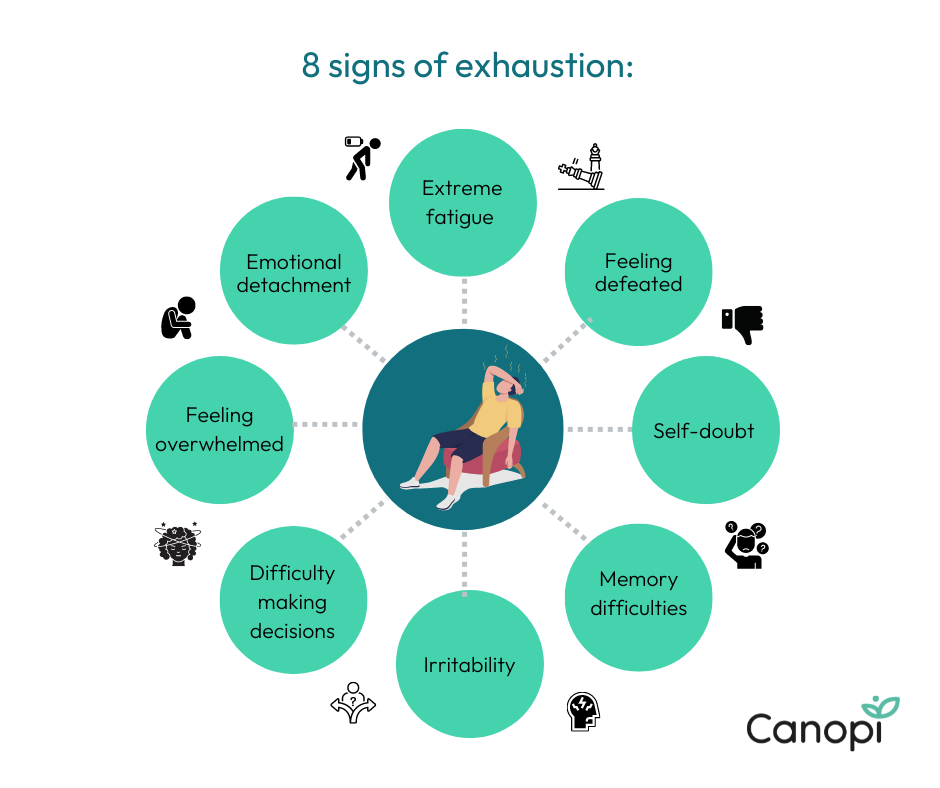An exhausted workforce?
In previous blogs, Canopi service users from the health and social care sector have shared their experiences with us. Whatever their reasons for seeking help, most if not all these individuals have experienced a state of emotional or physical exhaustion.
Caring roles are both physically and emotionally demanding and often prompt us to put the wellbeing of more vulnerable individuals above our own. Additional workforce challenges such as a lack of resources or staff and subsequent moral dilemmas (see blog on ‘Moral Injury’) can place a high level of stress upon an individual.
Stress can be good for us, but what happens if we are exposed to high levels of stress without taking time to manage our wellbeing? The result can be a stress-related exhaustion disorder (ED).
It’s not just fatigue
Exhaustion disorder is not simply feeling ‘tired’. It is defined as ‘a clinical condition characterized by psychological and physical symptoms of exhaustion developed in response to long-term psychosocial stress’ (Grossi et al., 2015).
Mental and physical exhaustion has distinct signs that impact our day-to-day functioning and ‘cognition’ including executive function, working memory, attention and processing speed (Gavelin et al 2020).
If we are already in a cycle of stress-related exhaustion, are having difficulty making decisions, remembering important tasks and problem solving, then the cycle may continue without proper intervention.
What are the signs of exhaustion?

1.) Extreme fatigue: You may feel tired (even after a good night’s sleep) and feel unable to participate in day-to-day activities such as making dinner or exercising.
2.) Feeling defeated: You may feel as if you are not making a difference at work, home or in the community.
3.) Self-doubt: When we are having cognitive difficulties, we may question whether we are doing a good enough job.
4.) Memory difficulties: You may find it difficult to remember certain tasks or information, aka ‘brain fog’.
5.) Irritability: You may become irritable or impatient with those around you.
6.) Difficulty making decisions: Stress can cloud our ability to make sound decisions.
7.) Feeling overwhelmed: Sometimes it can feel like our work, home or other life commitments are too much for us and we are ‘drowning’.
8.) Emotional detachment: We may try to detach ourselves from work and personal relationships completely in an attempt to protect ourselves from hurt.
I think I may be experiencing this. What can I do?
Practise gratitude
Start a journal and make a note of things you are grateful for. You can look back on this at any time.
Do things that you enjoy
Make more time for the things that you enjoy. If you’re unsure what to do, take a look at our Resources page.
Set achievable goals
When you identify the main causes of your stress, you may want to make small or big changes to alleviate it. This could be changes to your working hours or learning a new skill.
Make lists
If you’re having difficulty remembering tasks and information, making lists can be a helpful way to prompt you and avoid further stress.
Try meditation or physical activities
When we are stressed, we are often reflecting on past experiences or worrying about the future. Meditation can help us to feel present and grounded. Furthermore, meditation and other physical activities release feel good hormones to boost our mood. For suggested links and activities, visit our Resources page.
Speak to a professional
You could:
- Speak to your GP
- Refer yourself to Canopi. We provide acute mental health care for social and health care professionals in Wales. Find out more about our services.

